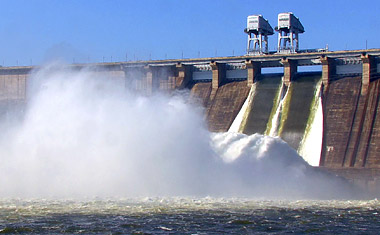Latest NEWS
- Aswat Masriya, the last word
- Roundup of Egypt's press headlines on March 15, 2017
- Roundup of Egypt's press headlines on March 14, 2017
- Former Egyptian President Hosni Mubarak to be released: lawyer
- Roundup of Egypt's press headlines on March 13, 2017
- Egypt's capital set to grow by half a million in 2017
- Egypt's wheat reserves to double with start of harvest -supply min
- Roundup of Egypt's press headlines on March 12, 2017
Renaissance Dam trio agree to new round of talks, after Khartoum meeting

Grand Ethiopian Renaissance Dam - Reuters
By Hend Kortam
CAIRO, Dec. 13 (Aswat Masriya) - Talks between the water and foreign ministers of Egypt, Ethiopia and Sudan, dubbed in the Egyptian media the six-way talks, ended without reaching an agreement on Saturday.
In statements to the state news agency MENA, Egypt's Water and Irrigation Minister Hossam Moghazi stressed on Sunday that the dam is a matter of "national security", adding that Egypt's historical rights to the Nile water are a "red line" which "we will not allow" to be crossed.
The three states have held up to 10 rounds of talks over the past two years and this is not the first round that ends in impasse. Talks will resume on Dec. 27 - 28, and will also involve the six ministers of water and foreign affairs.
This round of talks was focused on discussing the technical aspects of the Grand Ethiopian Renaissance Dam, an under construction hydro-electric dam which has been the cause of much tension between Egypt and Ethiopia.
Had the three countries agreed on the technical side, technical studies on the effects of the dam would have started but with very little announced by the governments, it remains unclear what exactly led to the stalemate.
However, at the end of the talks, which were held on Firday and Saturday, the ministers agreed to resume talks on political and technical sticking points, state-run news agency MENA said, citing the closing statement of this round of talks.
Egypt's water minister said today that the dam's construction is 48 percent complete, but that the reservoir in which Nile water will be stored, is only 20 percent complete. Egypt is concerned about how the dam will affect its share of Nile water.
Moghazi said that in the next round of talks, the three sides will discuss putting in place a mechanism that allows following up on construction on the ground to reassure the Egyptian side, in coordination with Ethiopia and in a manner that does not affect its sovereignty.
A French firm, assisted by a Dutch firm, had been selected in April to carry out the studies on the dam's effects on water supply, as well as its environmental, economic and social impacts on downstream countries Egypt and Sudan. However, the Dutch firm seems to have cold feet.
Moghazi said the three countries agree that the French firm deserves the highest grades but added that the Dutch firm is hesitant and that they are looking for a replacement.
For decades, Egypt has been receiving 55 billion cubic meters of the Nile river's water annually, the largest share, as per agreements signed in the past century in the absence of Ethiopia, whose Blue Nile tributary supplies most the water.
Once an agricultural state, Egypt relies on the Nile river as its main source of water but Ethiopia believes it is entitled to using the water for development, by creating electricity using the dam. The two countries have reiterated multiple times that they will not harm each other's interests, which seem to conflict.
Egypt, Ethiopia and Sudan signed a preliminary agreement on the Ethiopian dam on March 23, during a meeting of the trio's top leadership in the Sudanese capital Khartoum.
Ethiopian Prime Minister Hailemariam said at the time of the signing that his country will not accept that any harm is caused to the Nile river downstream countries, "specifically, the Egyptian people."










